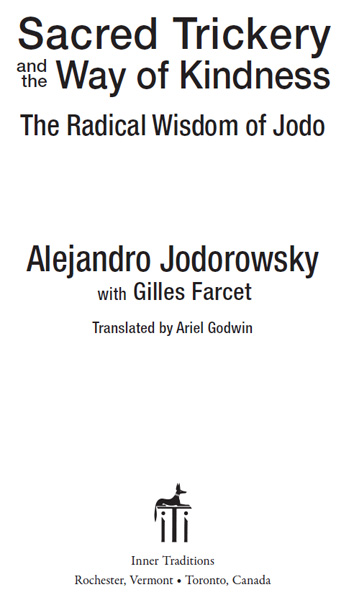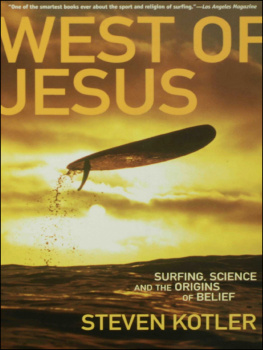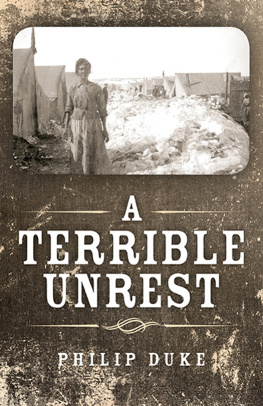
Praise forAlejandro Jodorowsky and His Works

Jodorowsky is a brilliant, wise, gentle, and cunning wizard with tremendous depth of imagination and crystalline insight into the human condition.
DANIEL PINCHBECK, AUTHOR OF
BREAKING OPEN THE HEAD
Alejandro Jodorowsky seamlessly and effortlessly weaves together the worlds of art, the confined social structure, and things we can only touch with an open heart and mind.
ERYKAH BADU, ARTIST AND ALCHEMIST
One of the most inspiring artists of our time.... A prophet of creativity.
KANYE WEST, RECORDING ARTIST
The Dance of Reality begs to be read as a culminating work....
LOS ANGELES TIMES
The Dance of Reality [film] is a trippy but big-hearted reimagining of the young Alejandros unhappy childhood in a Chilean town....
NEW YORK TIMES MAGAZINE
Manual of Psychomagic is great... like a cookbook of very useful recipes that can help us to understand our life and the universe we live in.
MARINA ABRAMOVI, PERFORMANCE ARTIST
His films El Topo and The Holy Mountain were trippy, perverse, and blasphemous.
WALL STREET JOURNAL
The best movie director ever!
MARILYN MANSON, MUSICIAN, ACTOR, AND MULTIMEDIA ARTIST
INTRODUCTION

TRICKERY, FIFTEEN YEARS LATER
By Gilles Farcet
In 1989 Dervy published La Tricherie sacre, a small volume of spontaneous conversations between Alejandro Jodorowsky and myself. This little book had a surprising destiny: without causing any hubbub, it continued to attract new readers over the years. Jodo already had a solid reputation as a storyline writer of bandes dessines, which he insisted on calling by their American name, comics. He was also known in France, his adopted country, as well as on the other side of the Atlantic, as a director of pioneering cult films. He was less well known as a free and brilliant spiritual maverick.
A free and brilliant maverick indeed, for how can one describe this man? A tarologist? But he is more than that, even though the consultations one finds advertised today in numerous trendy coffee shops have their origins in his Mystic Cabaret and in many cases are offered by his disciples. Spiritual master? Even though he sometimes likes to describe himself as a poor guru exploited by the spiritual business, Jodo is not and does not pretend to be a master in the traditional sense of the term. He does not fit into any specific tradition, even though he often makes reference to the masters who crossed his path, notably the Zen roshi Ejo Takata, the sorceress Pachita, and the mysterious Castaneda. As he has explained in our more recent conversations, when he believes that someone who has come to consult with him needs contact with a spiritual master, he directs her toward Arnaud Desjardins, because Jodorowsky does not see himself as proposing a path. An extraordinary esotericist? A healer always ready to pull a psychomagical act out of his hat? An atypical sorcerer? A transcendental illusionist? A sublime charlatan? In truth, regarding his spiritual life, as in all other aspects of his incredibly rich life, Jodorowsky is a being outside of the norm, one of those people whose very existence is an initiatory saga.
However abundant and varied his creativity may be, it is supported by an inner life, a truly spiritual journey. And the present book was the first significant account of that journey. Coming about as a small miracle, this book, conceived of when its subject had just reached the age of sixty, inaugurated a new era for him. While still pursuing his artistic activitiesessentially the comicshe became increasingly known among certain people in his role as a magus, much like Gurdjieff in his time, with whom Jodorowsky shares the distinction of having influenced numerous artists, as the testimonies in the third part of this book will show.
La Tricherie was also the prelude to another book, Le Thtre de la gurison, in which Alejandro developed his psychomagical vision.
Here I would like to share some memories from the era following the publication of La Tricherie.
I saw Alejandro and Arnaud Desjardins again on the occasion of their first meeting together, at my residence in Paris. I remember Arnaud as his familiar selfcuriousas a producer, to meet another filmmaker, and interested, as a disciple of the wayfor although he acted as master, Arnaud lived above all as a discipleto meet this unusual person whose depths he had become aware of through the reading of La Tricherie. And I remember Alejandro starting out sincerely shy, retreating into a corner at the beginning of the evening, wearing his purple suit, repeating in a candid tone: I am so in awe to meet such a person as Arnaud, I am only a poor man, what inestimable luck for a poor man like me...
The ice melted very quickly, and the timidity gave way to a very eloquent Jodo and an Arnaud radiating contentment. The former embarked upon a long discussion, as incomprehensible as it was fascinating, on the subject of the Ninja Turtlesin which, at the time, he saw as an esoteric saga (You understand, all explanations of the world today come down to the Ninja Turtles)as well as his memories of David Carradine, the Kung Fu hero, giving a stunning demonstration of karate in his living room in Los Angeles, finally returning to his magical encounter with Castaneda.
When I met Arnaud at his publishers the next morning, hewho was always so measured, prudent, and difficult to impress, even when rubbing shoulders with some of the biggest spiritual names of the centurysaid to me, with a childlike smile, Now Ive slept on it, I admit it: I am amazed by this Jodorowsky...
This was the beginning of a relationship of mutual respect. As Alejandro likes to say, they recognized one another mutually in their honesty.
And while we are on the subject of spiritual guides, I also remember a day in April 1992 when Lee Lozowick arrived. He was an American rock singer, relatively well known in France today, but at the time totally unknown.
As soon as he got off the plane from Arizona, on his first stay in France (which I had organized), he declared with a resolute air: I dont want to relax. No rest! I want action!
Because people at the end of a fourteen-hour trip involving a time change generally prefer a gentle beginning for their visit, I thought I had done well not to plan anything in particular for that first evening. What, then, could I suggest? How to improvise a fun time for a frenetic American guru and his entourage (for he was traveling with about ten people, his students, family, friends)? And then the obvious solution suddenly presented itself. Jodo! What other person could I call on the spur of the moment to entertain a clan of American shamanic rock disciples?
Hello, Alejandro?
Good evening.... An American guru? Bring them all over; Ill be expecting you at my place...
So it was that Lee and his entourage headed for the suburb of Vincennes and spent their first evening in Paris in very creative company, for besides the master of the house, we found there none other than Mbius and Boucq, two masters of comics reunited with their scriptwriter, mentor, and friend. We all sat around on cushions in a room of the house and improvised a sort of spontaneous workshop, led by Jodo with great verve in an English that was as fluent and melodious as his French. Each person talked about his practices, his manner of working, until Alejandro delivered the conclusion with his typical serious humor: The problem is, we all agree! The evening ended with Mbius and Boucq each hunched over a piece of paper on the floor, working on drawings for Lee. These drawings can be seen today, hanging in the refectory of his ashram in Arizona.
Next page









